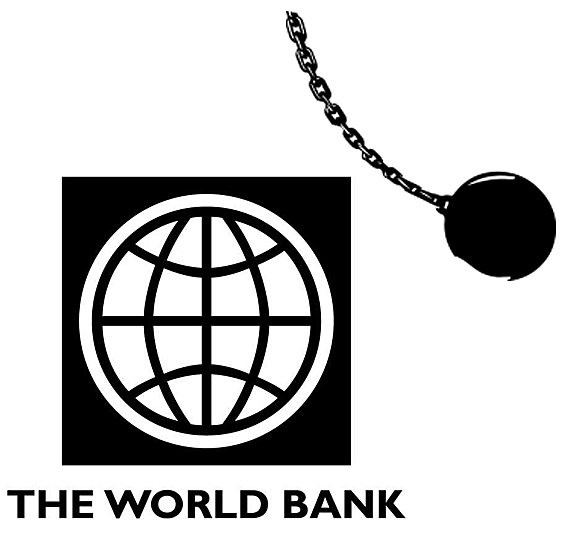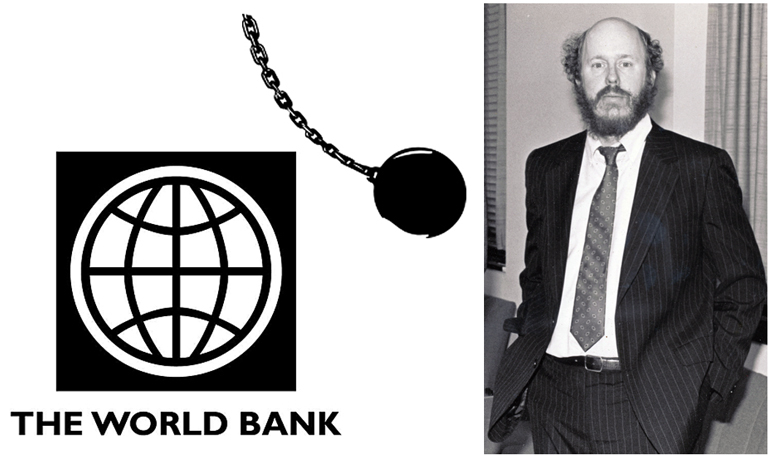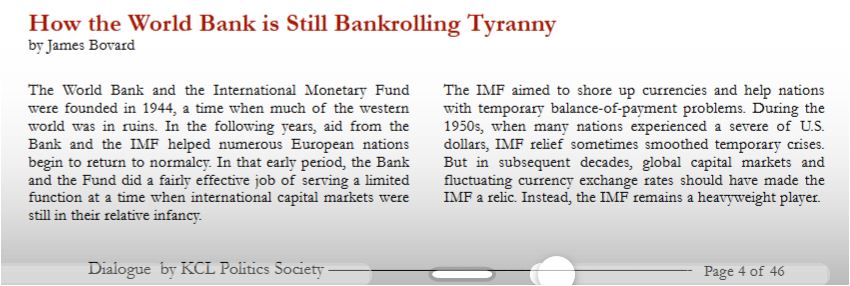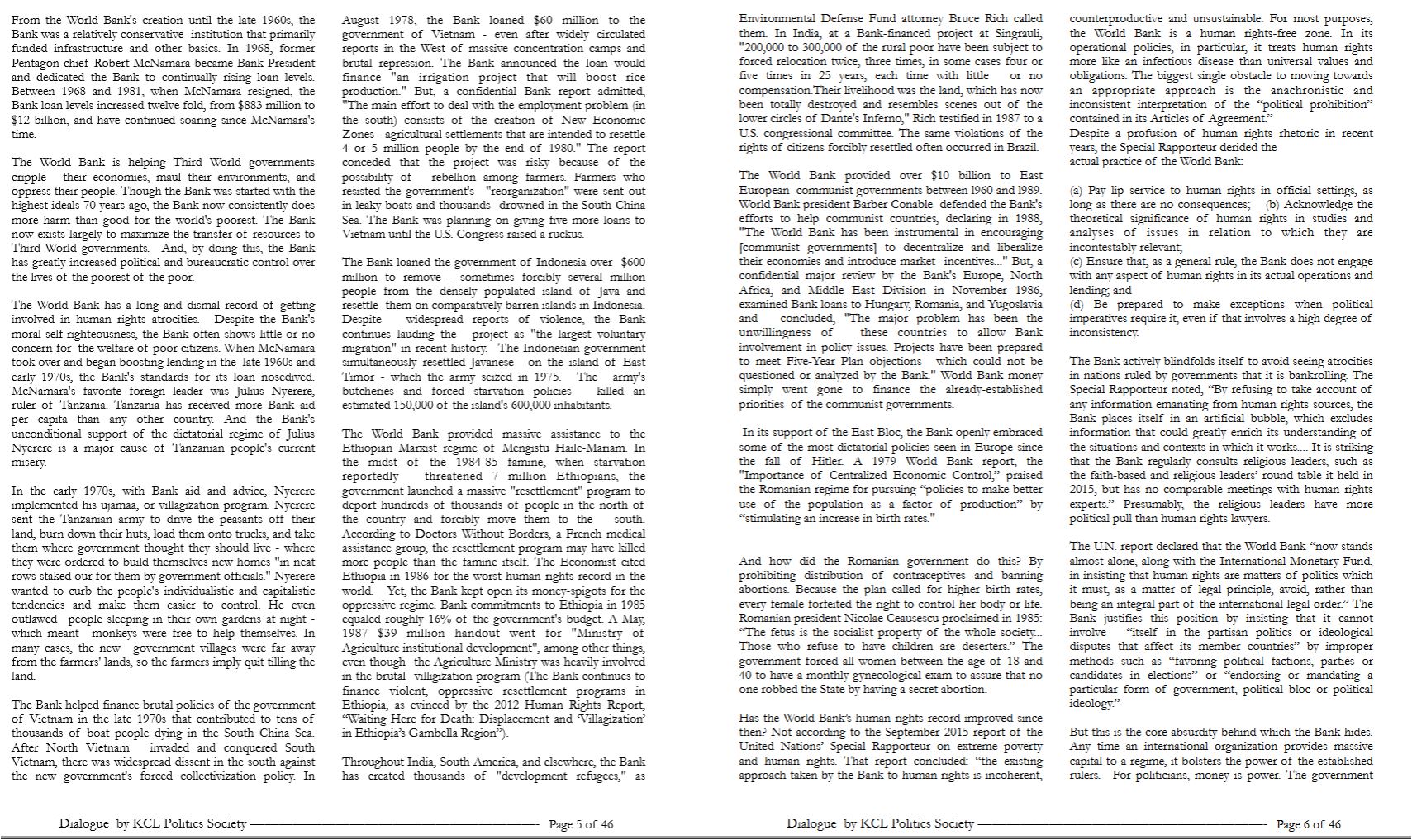 Jim Yong Kim, the president of the World Bank, announced today that he is quitting to take a better paying job in the private sector. This is a good opportunity to reconsider the Bank’s long record of bankrolling tyranny – a sordid practice that continued under Kim’s presidency. For decades, the World Bank has propped up many of the world’s most oppressive rulers. I have been thumping the Bank since the 1980s, when several Bank officials – including its president – denounced my articles. It is past time for the United States to cancel its membership and reclaim its contributions. Here’s a piece I wrote for Dialogue, a magazine published by King’s College London in 2016. Their tagline kindly described Public Policy Hooligan as “fascinating” – which maybe explains why that memoir was a bestseller in Belfast.
Jim Yong Kim, the president of the World Bank, announced today that he is quitting to take a better paying job in the private sector. This is a good opportunity to reconsider the Bank’s long record of bankrolling tyranny – a sordid practice that continued under Kim’s presidency. For decades, the World Bank has propped up many of the world’s most oppressive rulers. I have been thumping the Bank since the 1980s, when several Bank officials – including its president – denounced my articles. It is past time for the United States to cancel its membership and reclaim its contributions. Here’s a piece I wrote for Dialogue, a magazine published by King’s College London in 2016. Their tagline kindly described Public Policy Hooligan as “fascinating” – which maybe explains why that memoir was a bestseller in Belfast.
Here’s the text of the article below, with images of the article at the bottom of this page.
WORLD BANK STILL BANKROLLING TYRANNY
by James Bovard
The World Bank and the International Monetary Fund were founded in 1944 – a time when much of the western world was in ruins. In the following years, aid from the Bank and the IMF helped numerous European nations begin to return to normalcy. In that early period, the Bank and the Fund did a fairly effective job of serving a limited function at a time when international capital markets were still in their relative infancy.
The IMF aimed to shore up currencies and help nations with temporary balance-of-payment problems. During the 1950s, when many nations experienced a severe of U.S. dollars, IMF relief sometimes smoothed temporary crises. But in subsequent decades, global capital markets and fluctuating currency exchange rates should have made the IMF a relic. Instead, the IMF remains a heavyweight player.
From the World Bank’s creation until the late 1960s, the Bank was a relatively conservative institution that primarily funded infrastructure and other basics. In 1968, former Pentagon chief Robert McNamara became Bank President and dedicated the Bank to continually rising loan levels. Between 1968 and 1981, when McNamara resigned, the Bank loan levels increased twelve fold, from $883 million to $12 billion, and have continued soaring since McNamara’s time.

1988 portrait of me outside the World Bank, whose confidential documents I regularly exposed in those years
The World Bank is helping Third World governments cripple their economies, maul their environments, and oppress their people. Though the Bank was started with the highest ideals 70 years ago, the Bank now consistently does more harm than good for the world’s poorest. The Bank now exists largely to maximize the transfer of resources to Third World governments. And, by doing this, the Bank has greatly increased political and bureaucratic control over the lives of the poorest of the poor.
The World Bank has a long and dismal record of getting involved in human rights atrocities. Despite the Bank’s moral self-righteousness, the Bank often shows little or no concern for the welfare of poor citizens. When McNamara took over and began boosting lending in the late 1960s and early 1970s, the Bank’s standards for its loan nosedived. McNamara’s favorite foreign leader was Julius Nyerere, ruler of Tanzania. Tanzania has received more Bank aid per capita than any other country. And the Bank’s unconditional support of the dictatorial regime of Julius Nyerere is a major cause of Tanzanian people’s current misery.
In the early 1970s, with Bank aid and advice, Nyerere implemented his ujamaa, or villigization program. Nyerere sent the Tanzanian army to drive the peasants off their land, burn down their huts, load them onto trucks, and take them where government thought they should live – where they were ordered to build themselves new homes “in neat rows staked our for them by government officials.” Nyere wanted to curb the people’s individualistic and capitalistic tendencies and make them easier to control. He even outlawed people sleeping in their own gardens at night – which meant monkeys were free to help themselves. In many cases, the new government villages were far away from the farmers’ lands, so the farmers imply quit tilling the land.
The Bank helped finance brutal policies of the government of Vietnam in the late 1970s that contributed to tens of thousands of boat people dying in the South China Sea. After North Vietnam invaded and conquered South Vietnam, there was widespread dissent in the south against the new government’s forced collectivization policy. In August 1978, the Bank loaned $60 million to the government of Vietnam – even after widely circulated reports in the West of massive concentration camps and brutal repression. The Bank announced the loan would finance “an irrigation project that will boost rice production.” But, a confidential Bank report admitted, “The main effort to deal with the employment problem ((in the south)) consists of the creation of New Economic Zones – agricultural settlements that are intended to resettle 4 or 5 million people by the end of 1980.” The report conceded that the project was risky because of the possibility of rebellion among farmers. Farmers who resisted the government’s “reorganization” were sent out in leaky boats and thousands drowned in the South China Sea. The Bank was planning on giving five more loans to Vietnam until the U.S. Congress raised a ruckus.
The Bank loaned the government of Indonesia over $600 million to remove – sometimes forcibly – several million people from the densely populated island of Java and resettle them on comparatively barren islands in Indonesia. Despite widespread reports of violence, the Bank continues lauding the project as “the largest voluntary migration” in recent history. The Indonesian government simultaneously resettled Javanese on the island of East Timor – which the army seized in 1975. The army’s butcheries and forced starvation policies killed an estimated 150,000 of the island’s 600,000 inhabitants.

Dressed in camo, waiting to give speech on World Bank perfidies at State Dept. hdq, Washington, late 1988
The World Bank provided massive assistance to the Ethiopian Marxist regime of Mengistu Haile-Mariam. In the midst of the 1984-85 famine, when starvation reportedly threatened 7 million Ethiopians, the government launched a massive “resettlement” program to deport hundreds of thousands of people in the north of the country and forcibly move them to the south. According to Doctors Without Borders, a French medical assistance group, the resettlement program may have killed more people than the famine itself. The Economist cited Ethiopia in 1986 for the worst human rights record in the world.
Yet, the Bank kept open its money-spigots for the oppressive regime. Bank commitments to Ethiopia in 1985 equaled roughly 16% of the government’s budget. A May, 1987 $39 million handout went for “Ministry of Agriculture institutional development”, among other things, even though the Agriculture Ministry was heavily involved in the brutal villigization program. (The Bank continues to finance violent, oppressive resettlement programs in Ethiopia, as evinced by the 2012 Human Rights Report, “Waiting Here for Death: Displacement and ‘Villagization’ in Ethiopia’s Gambella Region.”)
Throughout India, South America, and elsewhere, the Bank has created thousands of “development refugees,” as Environmental Defense Fund attorney Bruce Rich called them. In India, at a Bank-financed project at Singrauli, “200,000 to 300,000 of the rural poor have been subject to forced relocation twice, three times, in some cases four or five times in 25 years, each time with little or no compensation. Their livelihood was the land, which has now been totally destroyed and resembles scenes out of the lower circles of Dante’s Inferno,” Rich testified in 1987 to a U.S. congressional committee. The same violations of the rights of citizens forcibly resettled often occurred in Brazil.
The World Bank provided over $10 billion to East European communist governments between l960 and l989. World Bank president Barber Conable defended the Bank’s efforts to help communist countries, declaring in 1988, “The World Bank has been instrumental in encouraging [communist governments] to decentralize and liberalize their economies and introduce market incentives…” But, a confidential major review by the Bank’s Europe, North Africa, and Middle East Division in November 1986, examined Bank loans to Hungary, Romania, and Yugoslavia and concluded, “The major problem has been the unwillingness of these countries to allow Bank involvement in policy issues. Projects have been prepared to meet Five-Year Plan objections which could not be questioned or analyzed by the Bank.” World Bank money simply went gone to finance the already-established priorities of the communist governments.
In its support of the East Bloc, the Bank openly embraced some of the most dictatorial policies seen in Europe since the fall of Hitler. A 1979 World Bank report, the “Importance of Centralized Economic Control,” praised the Romanian regime for pursuing “policies to make better use of the population as a factor of production” [italics added] by “stimulating an increase in birth rates.”
And how did the Romanian government do this? By prohibiting distribution of contraceptives and banning abortions. Because the Plan called for higher birth rates, every female forfeited the right to control her body or life. Romanian president Nicolae Ceausescu proclaimed in 1985: “The fetus is the socialist property of the whole society… Those who refuse to have children are deserters.” The government forced all women between the age of 18 and 40 to have a monthly gynecological exam to assure that no one robbed the State by having a secret abortion.
Has the World Bank’s human rights record improved since then? Not according to September 2015 report of the United Nations’ Special Rapporteur on extreme poverty and human rights, Philip Alston. That report concluded: “the existing approach taken by the Bank to human rights is incoherent, counterproductive and unsustainable. For most purposes, the World Bank is a human rights-free zone. In its operational policies, in particular, it treats human rights more like an infectious disease than universal values and obligations. The biggest single obstacle to moving towards an appropriate approach is the anachronistic and inconsistent interpretation of the “political prohibition” contained in its Articles of Agreement.”
Despite a profusion of human rights rhetoric in recent years, the Special Rapporteur derided the actual practice of the World Bank:
(a) pay lip service to human rights in official settings, as long as there are no consequences; (b) acknowledge the theoretical significance of human rights in studies and analyses of issues in relation to which they are incontestably relevant; (c) ensure that, as a general rule, the Bank does not engage with any aspect of human rights in its actual operations and lending; and (d) be prepared to make exceptions when political imperatives require it, even if
that involves a high degree of inconsistency.
The Bank actively blindfolds itself to avoid hearing about atrocities in nations ruled by governments that it is bankrolling. The Special Rapporteur noted, “By refusing to take account of any information emanating from human rights sources, the Bank places itself in an artificial bubble, which excludes information that could greatly enrich its understanding of the situations and contexts in which it works…. It is striking that the Bank regularly consults religious leaders, such as the faith-based and religious leaders’ round table it held in 2015, but has no comparable meetings with human rights experts.” Presumably, the religious leaders have more political pull than human rights lawyers.
The U.N. report declared that the World Bank “now stands almost alone, along with the International Monetary Fund, in insisting that human rights are matters of politics which it must, as a matter of legal principle, avoid, rather than being an integral part of the international legal order.” The Bank justifies this position by insisting that it cannot involve “itself in the partisan politics or ideological disputes that affect its member countries” by improper methods such as “favoring political factions, parties or candidates in elections,” or “endorsing or mandating a particular form of government, political bloc or political ideology.”
But this is the core absurdity behind which the Bank hides. Any time an international organization provides massive capital to a regime, it bolsters the power of the established rulers. For politicians, money is power. The government can use the money to buy influence, buy off opponents, or otherwise quell discontent. After the United States invaded Afghanistan and Iraq, the Pentagon coined a term that perfectly captures the effect of foreign aid: “Money as a Weapon System.” The fact that some World Bank loans may be put to productive uses does not change the reality that the cash infusion enables rulers to shore up or extend their sway.
This is especially unfortunate since so many nations are ruled by kleptocracies – governments of thieves. There is a heavy overlap between the lists of the world’s most corrupt nations compiled by Transparency International and the list of World Bank aid recipients.
The World Bank has long been aware that it is financing despots who tyrannize their people but the Bank’s own incentives have made it incorrigible. As a 1992 World Bank report admitted, the Bank is driven “to push money out the door.” If the Bank admitted how many of its borrowers were repressive or hopelessly inept, its loan levels would collapse. And the Bank’s sinecures are far too comfortable for its employees to permit that to happen.
Has the Bank helped the Third World? Some countries have benefitted but most of the long-term aid recipients have only ended up with heavy debt loads, swollen public sectors, and overvalued exchange rates. Instead of spurring reform, most aid in the past has simply allowed governments to perpetuate their mistakes. If the Bank has not straightened out Third World economic policies after disbursing over a hundred billion dollars in aid, what chance is there that more Bank lending will correct the problems in the future?
A 1993 World Bank report noted that foreign investment was sharply increasing in the Third world. But, the report warned that many foreign governments have reputations that are too shady to win investors’ confidence: “The risks of doing business are much increased in countries where the rules of the game are unclear or where the state does not ensure that private contracts are enforced and where the judiciary system does not function well… Inadequate administration of justice, deficient property rights, frequent political interference in private business, corruption and excessive red tape are among the most serious obstacles to private investment.” If foreign governments are too untrustworthy for investors to risk their capital, then how likely is it that the same governments are trustworthy enough to productively use handouts they receive from the World Bank? The only thing that the Bank can do now that private lenders cannot or will not do is provide money on easy terms to uncreditworthy borrowers.
Giving countries money that is badly used is worse than not giving them any money at all. Empowering corrupt and inept politicians to rule over their people has nothing to do with real development.
++ Here’s a larger size version of that “me & the wrecking ball” thumbnail –




Comments are closed.